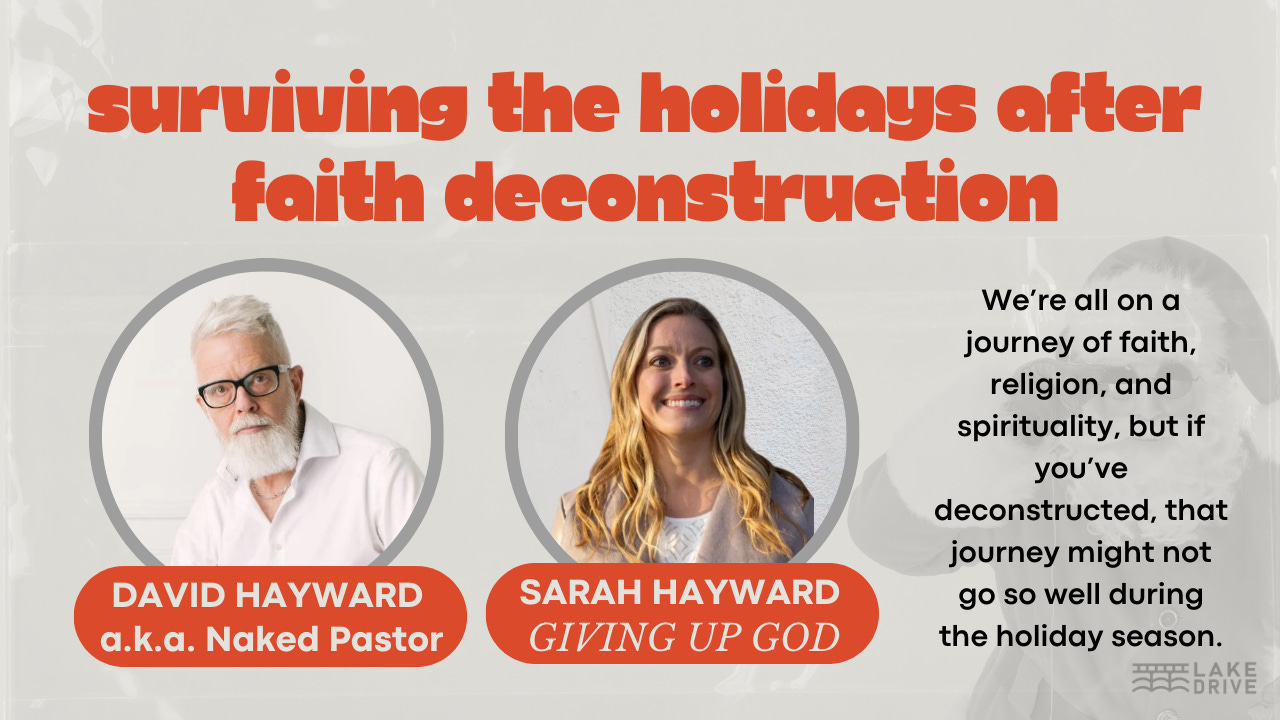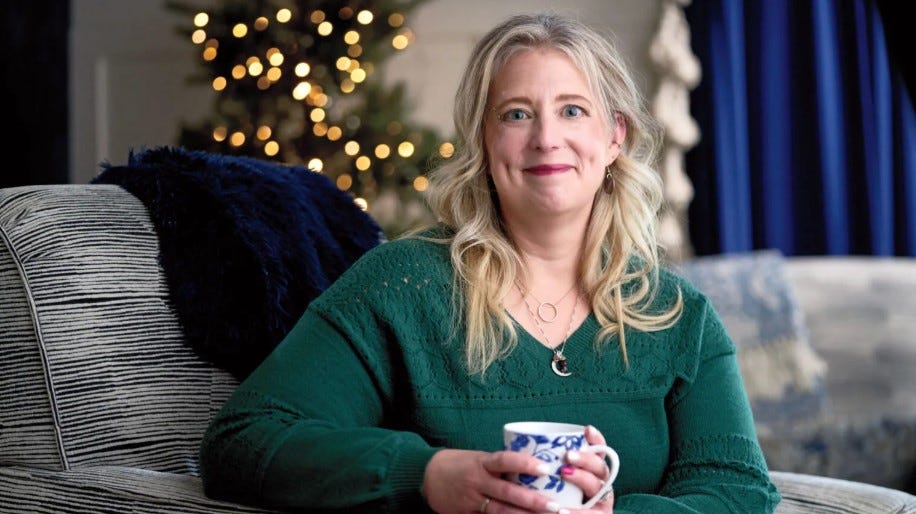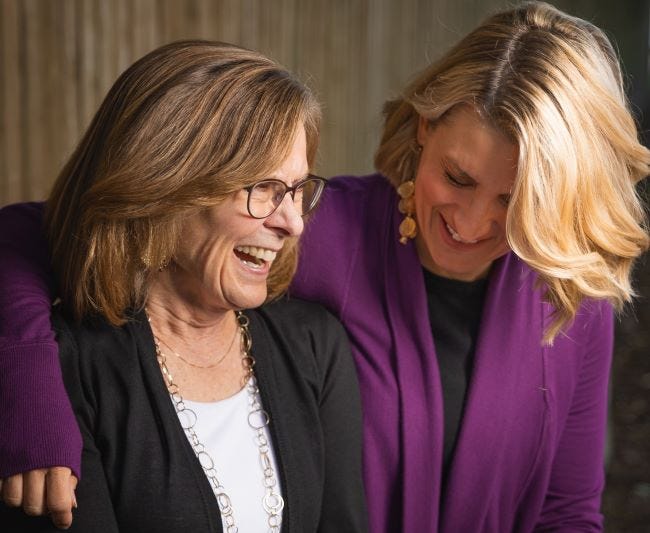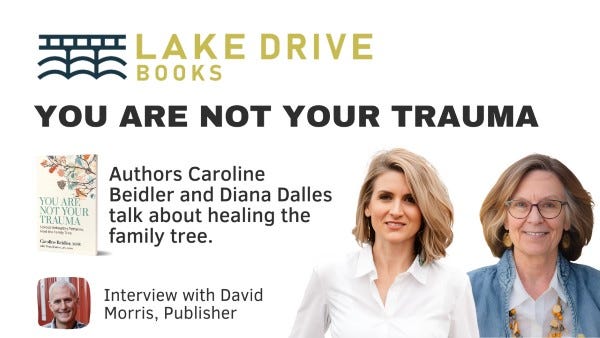Friends, some quick FYIs from Lake Drive, then the article below:
In case you missed it, we have a YouTube video of author Sarah Henn Hayward (Giving Up God) conversing with Naked Pastor David Hayward (no relation) about “Surviving the Holidays after Faith Deconstruction.” Check it out.
It was a delight to see Faith Doesn’t Erase Grief author Kate J. Meyer appear in Guideposts magazine offering her expert insights about “6 Tips to Help Someone Grieving During the Holidays.”
And finally, if you are like so many who’ve migrated away from Twitter/X, you can now find Lake Drive Books on Threads and Bluesky for more up-to-date posts on what’s going on, insights from our authors, and more.
Grateful for you,
David Morris, Publisher
A Mother-Daughter Conversation on Generational Trauma
by Lake Drive Reporter
Trauma leaves indelible marks on the soul, but as
and her mother, Diana Dalles, illustrate in their powerful book You Are Not Your Trauma: Uproot Unhealthy Patterns, Heal the Family Tree, those marks don’t have to define us. In a candid video conversation with Lake Drive Books publisher David Morris, Caroline and Diana explore the depths of trauma, the heights of recovery, and the transformative power of radical honesty and intergenerational healing.Caroline Beidler, a recovery advocate and author, joined forces with her mother, Diana, to craft a book that melds their unique but intertwined stories. For Diana, participating in the book fulfilled a lifelong dream of putting her experiences into words on a page for others to read. “It’s empowering,” she shared, “letting people know who I am and that it’s okay to be who they are.”
Caroline echoed the sentiment, explaining how her mother’s heartfelt personal writings from the past became the catalyst for collaboration. “When she shared her journal and I read it,” Caroline said, “I realized we could bring something to life that would help others on their healing journeys.” Together, their voices form a tapestry of hope, showing that while trauma might touch many, recovery and joy are universally attainable.
Dreams Can Return
One poignant moment in the discussion centered on a phrase from the book: “Dreams don’t just come true; they come back.” Caroline reflected on how trauma often robs individuals of their ability to dream. “When I experienced significant trauma,” she said, “every hope and dream I had for myself disappeared.” But through recovery, dreams re-emerged. “You get to a point in healing where life holds possibility again,” she explained. For readers, this sentiment is both a reassurance and an invitation—a reminder that the capacity to dream is never lost, only dormant.
Radical Honesty: Owning Your Story
A core theme in You Are Not Your Trauma is the concept of “radical honesty,” one of the book’s five rhythms for healing. Radical honesty involves embracing one’s past without allowing it to dictate the present. Diana emphasized that owning her story enabled her to set her past in perspective. “I thought I needed to keep the memory alive to validate my experiences,” she said, “but I’ve learned you can acknowledge the past without letting it limit you.”
Caroline added that this rhythm resonates with many in recovery. “For years, I identified with my trauma,” she explained. “But healing allowed me to see my experiences through a lens of resilience. Trauma is part of my story, but it’s not my identity.”
The Intergenerational Connection
Caroline and Diana’s daughter and mother partnership underscores an essential aspect of the book: the impact of intergenerational trauma and healing. “Our stories highlight what intergenerational trauma looks like,” Caroline said. Diana’s journal-inspired interludes offer raw, unfiltered glimpses into her experiences, which complement Caroline’s structured insights. Together, they demonstrate that healing can ripple across generations.
“When I visit Caroline,” Diana shared, “I’ve joined her in recovery meetings and felt an incredible acceptance. The recovery community has been so healing, and I’ve shifted many of my friendships to reflect this new chapter of my life.”
The Five Rhythms: A Blueprint for Recovery
In You Are Not Your Trauma, Caroline introduces five rhythms for healing: practical steps that guide readers through self-discovery and recovery. One of her favorites is “honoring the self” through setting boundaries. “Boundaries are essential for valuing yourself and breaking free from unhealthy patterns,” she said.
Each rhythm is paired with reflection questions and practical exercises, ensuring readers can internalize the lessons. For those who order the book, Caroline has also created a guided journal to deepen the experience.
Compassion: A Healing Force
Both Caroline and Diana’s professional backgrounds—as social workers and advocates—inform their compassionate approach to recovery. Diana’s career spanned decades in medical and hospice social work, and she attributes much of her personal growth to this work. “Compassion used to stir my own pain,” she explained, “but I’ve learned to channel it without retraumatizing myself.”
Caroline’s career has focused on creating recovery support services, from collegiate programs to peer mentorship. Today, she continues to influence policy at the federal level while offering direct support through her writing and workshops. “Everything I do is centered on compassion and connection,” she said.
The Power of Sharing Stories
Caroline’s e-newsletter, Circle of Chairs, explores facets of recovery like mental health, supporting loved ones with addiction, understanding trauma, and sharing stories. “When we share our stories, we empower others to share theirs,” she said. This philosophy is woven into the fabric of You Are Not Your Trauma. By sharing their deeply personal experiences, Caroline and Diana hope to inspire readers to embrace vulnerability and pursue their healing paths.
For Caroline and Diana, You Are Not Your Trauma is more than a book—it’s a mission. “We want people to know they’re not alone,” Diana said. “There is hope.”
Whether you’ve experienced trauma or simply want to support loved ones on their healing journeys, this book offers a compassionate, practical roadmap. As Caroline summarized, “Trauma might shape our stories, but it doesn’t have to define them.”
Caroline Beidler, MSW is a recovery advocate and founder of the recovery storytelling platform Circle of Chairs. She has twenty years in leadership within social work and ministry, is a writer with Recovery.com, the founder and host of the annual International Women’s Day Global Recovery Event, and a consultant with JBS International writing and creating content for federal agencies like the Office of Recovery and the Substance Abuse and Mental Health Services Administration. She is also the author of Downstairs Church: Finding Hope in the Grit of Addiction and Trauma Recovery. She lives in eastern Tennessee.
Diana Dalles, LPN, MSSW has been writing poetry and journaling since her teenage years, mainly for enjoyment and healing. She spent the early years of her career in the nursing field, then worked for thirty-five years as a professional social worker. Her employment interests included hospice, medical social work, and gerontology. She has facilitated grief, trauma, and women’s empowerment groups. Now retired, she spends time with family, gardens, volunteers at a local food pantry, and is involved in her church’s ministries. Diana lives with her cat in a small rural Wisconsin town.
Thanks for your support of Lake Drive Books. Would you consider sending this note to a friend? If you’re receiving this newsletter from a friend, be sure to sign up below and you’ll receive an opportunity to download one of our insightful audiobooks. Our newsletter is meant to inspire and inform, and along the way, we’ll make exclusive offers on our books to our newsletter subscribers.







